The Chosen Succeeds Where ‘Woke’ Stories Fail
I’ve become a fan of one popular TV show that focuses on history’s most marginalized people group. This show includes major female leads. It criticizes racism. And it features disabled and neurodivergent characters as series regulars, with most of its cast as people of color.
This is The Chosen, the smash-hit historical drama showing Jesus Christ through the eyes of people who knew him. It’s not a typical Bible show, and if it wasn’t expressly Christian, it would probably be sweeping the Emmys for its diversity and inclusion.
The facts and numbers-driven disciple Matthew is on the autism spectrum. Little James is played by an actor with scoliosis and cerebral palsy. Mary Magdalene can read and write despite the first-century societal norms. Storylines even address racism, with Jesus justly ripping into Big James and John for their prejudice against Samaritans.
So why does The Chosen get a pass from critics of “woke” stories?1 Because it’s a Bible show? Unlikely, considering that Noah (2014) drowned in angry viewers’ criticism for depicting a “just man” as a homicidal environmentalist acting on orders from an equally-maniacal “creator’s” apocalypse.2
Instead, “woke” projects fail and The Chosen succeeds for a more nuanced reason. Wokeism is not simply the inclusion of diverse or underprivileged characters. In fact, stories that show many ethnic backgrounds, lifestyles, and situations demonstrate a realistic reflection of God’s creation. I think Hollywood often fails, however, when they take these realities and force them to be something else.
The Chosen is not a respecter of persons
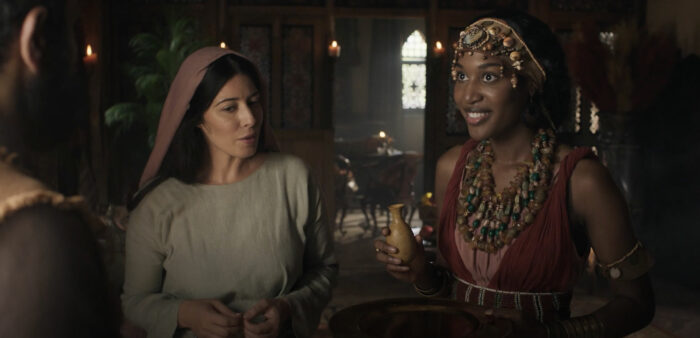
“The Chosen” features a diverse cast and strong female characters who overcome trauma (Mary Magdalene) and boldly speak their mind (Tamar).
Hollywood often lauds circumstances over morals and skin color over virtues. If our skin or environments really defined us in the ways movies normalize, we’d be living in a hopeless, one-dimensional world.
Peter, however, says “God is no respecter of persons” (Acts 10:34, KJV). This doesn’t mean God does not discriminate. Instead, a person’s present lifestyle, disability, or privilege doesn’t change how God treats them in his mission to save them from sin.
The same is true with The Chosen. It presents biblical characters who have autism and disabilities. These men and women come from many ethnic backgrounds. They’re all deeply human, with different hopes and traumas. Many struggle with selfishness and prejudice. Some are rich or poor. But all of them need rescue.
But The Chosen doesn’t exalt Matthew’s autism over his other qualities, nor pander to Little James for being disabled. Instead, the show focuses on a complex person, not a quality. Matthew is an autistic Jew, hated by his people and marginalized by Romans, but he’s not without his own faults. He struggles with selfishness and arrogance even after abandoning his role as a tax collector to follow Jesus.
If the show defined these characters by only one aspect of their lives, their realistic complexity would give way to flat icons, useful only for sermon illustrations.
The Chosen tells a good story, not a political sermon
Ironically, The Chosen features the greatest Preacher in history, yet doesn’t actually preach. Yes, stories need moral lessons and positive themes, but not at the expense of the story itself. Hollywood projects, however, often start by preaching a sermon titled “Women Are Superior Over Men,” or “White People Are Inherently Racist,” and contrive a flashy-looking story to cover it up. They seek actors who check the boxes, and they write plots to push political correctness rather than universal truths.
I also find it ironic that the predominantly anti-God film industry erects “icons” of ideal characters in metaphorical stained-glass windows. These characters—ranging from Mary Sues to token minorities—often feel distant, unrelatable, and not unlike the pasty Jesus of cathedral art.
But The Chosen’s creator, Dallas Jenkins, didn’t start with a predefined anything, aside from what’s actually in the Bible. He didn’t begin with denominational traditions or appeal to one sect of Christianity over another like previous Bible projects. Instead, The Chosen focuses on the biblical accounts of these characters. That’s why anyone, regardless of faith or denomination, can appreciate this story.
The Chosen understands its source material
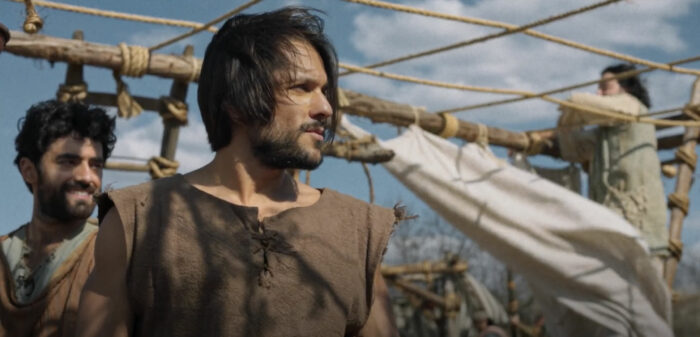
The Chosen integrates Jewish customs and festivals into their stories, including the construction of a Sukkot (tent or tabernacle) for the Feast of Tabernacles.
Not every film adaption should directly translate its source, but good adaptions will stay true to their sources’ themes. That’s why I loved the Dreamworks movie How To Train Your Dragon and hated the fan-disowned monster-child Percy Jackson. Dragon kept the heart of the story, a friendship between two outcasts. Percy did not, and drastically shifted the story’s entire focus.
Hollywood’s current hobby is taking beloved stories and mutating them into horrifying monsters. Even many “progressive” viewers are utterly baffled by Mindy Kaling’s Velma, with most critics considering this a deranged cannibalism of beloved cartoon Scooby-Doo.
The Chosen doesn’t have to be a direct translation. It’s film, not Scripture. Although the show’s meticulous writers never contradict the source material, their fictional additions honor biblical characters rather than race-swap, gender-bend, or corrupt their personalities. Often these additions even correct the influences of various Christian popular cultures (often based on medieval and Renaissance art tropes). For example, Jesus prays Jewish prayers. Disciples attend Jewish holidays. Costumes include tzitzits (a Jewish tassel) on garment hems, in accordance with the Torah. Characters actually look, act, and sound Jewish in line with the source material.
As a cultural advisor for the show, Messianic Rabbi Jason Sobel appreciates this emphasis. “I love the fact that there’s a very ethnic feel to the disciples,” he said in a Roundtable discussion with Dallas Jenkins, citing the disciples’ accents and Shahar Isaac’s (who plays Simon Peter) Israeli-born heritage.3
The Chosen doesn’t take advantage of diversity for relevancy
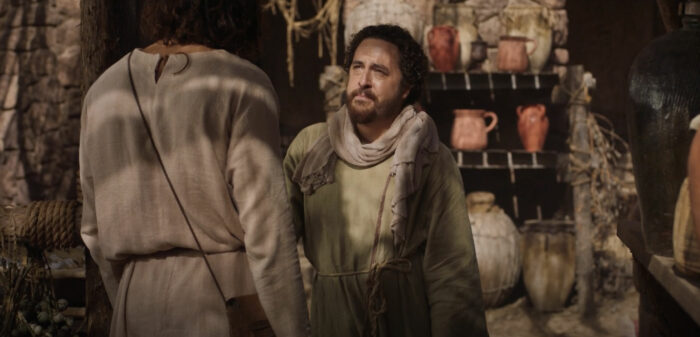
In a scene that emotionally wrecked its audience, Little James (played by Jordan Walker Ross) tearfully confronts Jesus over why he hasn’t been healed, voicing the same thoughts Ross and other viewers with disabilities have wrestled with themselves.
Ultimately, I appreciate The Chosen never forcing diverse actors and characters to be poster children, only to throw them under the bus in response to criticism. By contrast, I’ve seen at least one major movie studio publicly imply that fans are racists toward an actress if they hated her fictionalized role. Imagine being told that you’re hated because of your skin color, not because fans hated a poorly written script.
“Woke” Hollywood also pushes the inclusion of minority characters to provide more opportunities for actors. And while that’s admirable, actor Jordan Walker Ross (Little James) has admitted in one Deadline interview that he’d been “cut out of projects” because of his real-life disability.
“I have been told by casting directors to ‘lose the limp,’” he said.4
In The Chosen, however, Ross’s limp reflects in the apostle Little James, who wrestles with questions about why Jesus hasn’t healed him. This leads to season three’s emotional confrontation between him and Jesus, which left me in tears.
“It’s something I related to more than any scene I’d ever done,” Ross said in a Chosen App Aftershow interview. He called the scene “therapeutic” because it voiced questions he had about his own limp.5
Other film creators haven’t been so considerate—actually telling a disabled person to get over it. Of course, we can’t characterize all Hollywood based on a few examples of hypocrisy, but it’s unfortunate that people can’t work unless they fit impossible ideals.
“It’s all about how you look instead of what’s inside,” said Elizabeth Tabish (Mary Magdalene) in a CBN interview, critical of the Hollywood ideal after nearly washing out of the industry. “The problem with Hollywood-type roles is that you have to look perfect.”6
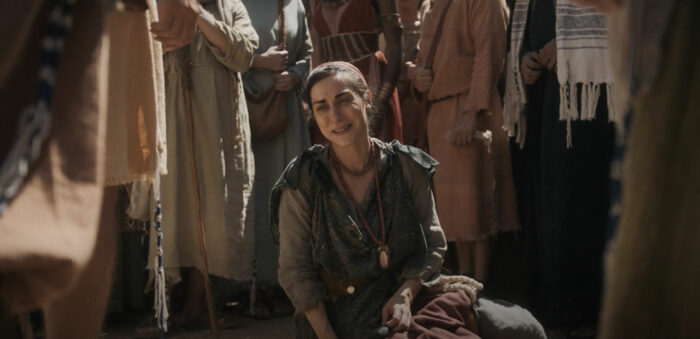
An emotional Veronica assures Jesus she only touched the hem of his garment (his Jewish tzitzit) so he wouldn’t be ceremonial unclean by Jewish law.
Dallas Jenkins, by contrast, doesn’t make any decisions just for looks. He sees the authentic diversity in his show as “human.”
“Trying to take the Gospel and be like ‘All right … we’re going to have more diversity just to be politically correct, just to appeal to as many people as possible’—that would be a problem,” Jenkins said, after discussing the reasons for writing Matthew as autistic.
Jenkins explained that Matthew’s autism was inspired by his own familial experiences with the condition, as well as clues from Scripture.
“This is plausible. If it’s plausible, it happens to allow the viewer to connect more deeply to the people [characters] and to see Jesus through the eyes of people who actually followed him,” Jenkins said.7
Society demands diverse storytelling, but mainstream projects bomb at the box office because people are tired of political sermons. Yet The Chosen introduces a more biblical view of Jesus and deeply human disciples through thoughtful storytelling and diverse characters. In fact, it succeeds in everything “woke” Hollywood claims to do. Maybe it’s a sign that film studios should, as The Chosen’s version of Jesus says, get used to different.
- Originally the term “woke” described someone who is aware of important social issues and the need for activism. Critics since devolved the term into an umbrella definition of often left-leaning sociopolitical beliefs and a sense of moralistic virtue-signaling forced upon others. I use “woke” and “wokeism” in quotations to refer to this devolved definition, rather than its more traditional meaning. ↩
- For example, see an original Matt Walsh review, “I’m a Christian and I think ‘Noah’ deserves a four star review,” March 2014. ↩
- “The Chosen Must Portray Jesus Accurately,” The Chosen on YouTube, Aug. 11, 2020. ↩
- David Robb, “Jordan Walker Ross Says His Disability Took His Character On ‘The Chosen’ To New Level,” Deadline, April 22, 2021. ↩
- “Aftershow: S3 E2,” 18:00 and 25:60, The Chosen App, Dec. 18, 2021. ↩
- “Once Skeptical, ‘The Chosen’ Actor Says Series Changed Her: ‘God Has Been There the Whole Time’,” CBN News on YouTube, Oct. 14, 2022. ↩
- “Is ‘The Chosen’ Biblical? | Guest: Dallas Jenkins | Ep 726,” Allie Beth Stuckey on YouTube, Dec. 19, 2022. ↩



























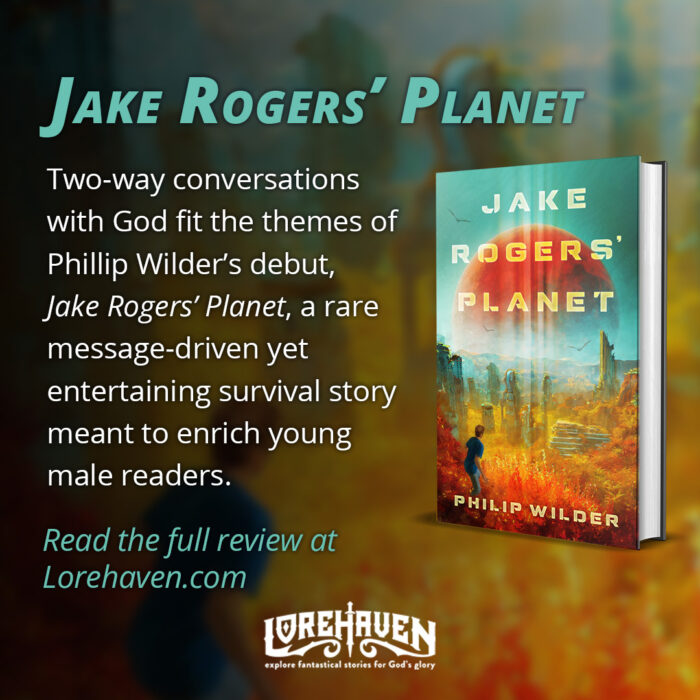


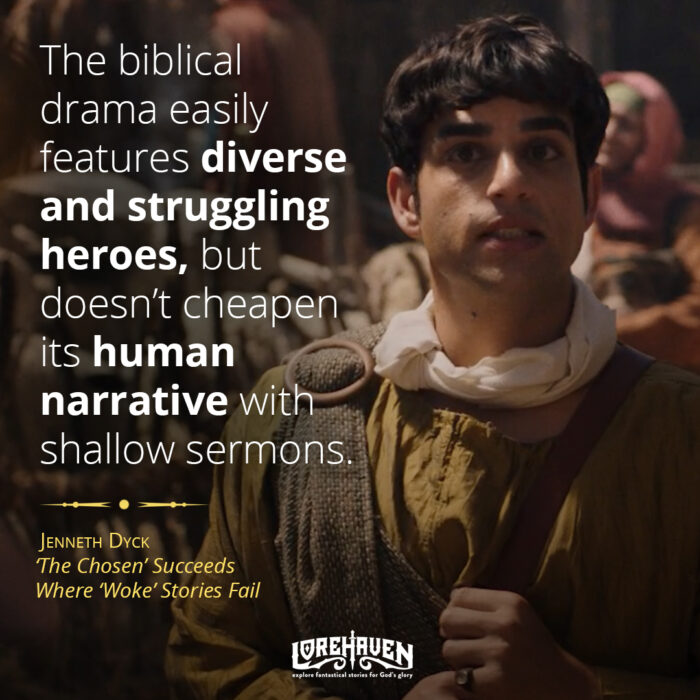


Wonderful article. I love “The Chosen” but had not considered these aspects. Thanks so much!
Thank you! It was a pleasure to dive into this side of things. I rarely considered the Jewishness and ethnical realities of the gospels before The Chosen, partially because the extent of our biblical fiction and dramas were either westernized, or simply too limited in their medium to properly explore. The Chosen completely redefined my perspective. I’m so glad you enjoyed the read!
Excellent article!!
I’ve started watching The Chosen while I’m at the gym. It forces me to not half-watch the show in a binge.
It’s served it’s two primary purposes. Entertainment that is as pure as possible for a human-made project.
It challenges me to go to scripture and really study Jesus and His ministry.
I’m on season 1. My two hot takes.
I love Matthew and having him on the spectrum is a solid decision. However, the dialogue on “how different” he is seems slightly heavy-handed at times. I suspect it’s because most of the people I know on the spectrum who are similar to Matthew seem pretty “normal” to me vs. “different.”
2. I work with 5-6 graders at church and we studied John 3 earlier this year. Nicodemus is my favorite character on the show for his story arc, and someone I’ve enjoyed learning more about in scripture. I relate to him!
I love that it drives us back to the Bible. More than once I assumed a scene was creative license, until I discovered it later in the gospels. You’re in for a real treat—the seasons only improve as you go!
I will say that the “you’re a bit off” talk toward Matthew is rather self-contained in season one. I assume it was partially for our benefit (for those who might not immediately catch that he’s neurodivergent), but also an accurate response from people, who at the time, wouldn’t have known what autism is. That’s my personal guess.
Nicodemus is phenomenal. Erick Avari is top-shelf content, and the deeply-personal struggle he has through all of season one is just excellent. 10/10.
Thank you for this thoughtful, insightful review.
I’d like to respectfully offer another interpretation as to why The Chosen hasn’t set off any “woke” alarms among white evangelical Christians. Progressive-tending thought across the past hundred years has shaped American consciousness enough to make something like The Chosen tolerable to even the most conservative white American Christians (with the very careful caveats listed in the article above, of course). Here’s a comparison: Just 70 years ago, most American Christians considered racial intermarriage and social integration an unbiblical abomination—“Race Mixing is Communism,” they cried. But now it is normalized. What changed? Did American Christians just wake up one day enlightened, realizing they were wrong? No. The larger culture around them exerted enough pressure, across enough time, and dragged them, kicking and screaming, in a more inclusive direction. I think a similar sort of progressive normalization has happened with the reception of The Chose. I have no doubt that if The Chosen had come out just 30 years ago, white evangelical circles, instead of devouring it the way they are now, would have accused it of being leftist deep-state propaganda….
That said, I do appreciate the way the above reviewer asks us to be sensitive to the sort of cheap tricks Hollywood uses; as a Christian of color, I share that sensitivity with you and want that, if we are going to be inclusive, we be deeply and authentically so.
Perichoresis, I absolutely agree with your comments. Honestly, while I appreciated the author’s insightful take, I believe she cheapened its impact by delving into the whole “Woke” conversation. Frankly, it wasn’t necessary. To me, “The Chosen” works because it gives us all an insight into Jesus and the disciples’ every day lives and shortcomings without being preachy. I love the fact that Jesus can be snarky with some of the things he says. Matthew being presented as being in the spectrum reveals a layer that many of us hadn’t thought of before. And Simon Peter betrayal of the merchants adds another dimension to who he was and who he became. This didn’t need a “woke” narrative or framework to be introduced into it, because frankly it wasn’t there to begin with.
I loved the scene after the wedding where Jesus turned water into wine. He and his disciples are going home and some of them are stumbling. Some of them had a little too much to drink. Yep, some of them were drunk! But if the best wine the steward there had ever tasted had been served, that might well have been true. I love the realism, the recognition of his followers as human, and the authenticity of the production. These were real people. We’ve made them into allegorical characters and comic book figures. The Chosen has depicted them as human beings.